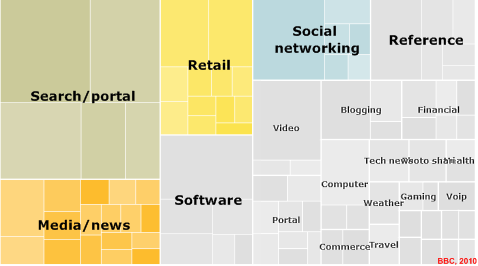Top 100 sites in 2010: Search giants, shopping, Facebook and a bit of porn

Courtesy of Neilsen data and info-graphics at the BBC, a new visualisation has been created to explain the interactivity of users and the sites they visit in the main browsing areas of the world, including the US, Australia, Brazil and a half-dozen European countries.
Without doubt, Google takes the major share of all unique users with nearly 350 million (7.4%) with Bing trailing behind at 270 million (5.7%) unique users. Yahoo! reaches nearly 5% of the share of the entire top 100 sites and other search engines and portals (the two are often combined nowadays) follow behind. Search is the most used tool on the web according to these Neilsen statistics.
The media takes a nice slice of the top websites including Fox News, CNN, the BBC, and Tribune Newspapers - which shows more readers are heading online for news than newspapers ever before - but the debate of whether newspapers are a dying medium is still ongoing. Variables such as availability, access, printing resources and local infrastructure take a major effect when weighing up media distribution to online news.
Even with the recession, the worst since World War II in some countries and economies, the retail online sector takes up nearly 10% of the entire list, with eBay (2.57%) surpassing Amazon (2.36%) with users hoping to get a better bargain from the online auction site.
And in an unsurprising move, Facebook takes 4.62% of the top sites surpassing Twitter, LinkedIn and MySpace (which isn't even registered as a top 100 site), showing that social networking is still a major player on the web and the shift away to "professional" social networking is rising. One could argue that with MySpace dipping as search rises, no wonder Rupert Murdoch hates the search industry.
The rest, including gaming, blogging, video (which unsurprisingly YouTube takes up a 4.3% share) and referencing sites (Wikipedia takes a 3.3% share), as well as commerce, tech news, blogging and peer-to-peer networking (LimeWire takes 0.5%). Online pornography appears in the top 100 list with Pornhub taking a 0.4% share.
According to the BBC, there are over 1.7 billion users on the web, over 154 trillion emails sent in the average day, 330,000 blog posts published in the average day and over 1.6 billion Google searches in the average day.
Using these statistics, the BBC have visualised the net growth of the Internet since 1998 which shows the vast majority of the world, excluding Africa, to be online. Only this week, the Queen of the Commonwealth and England said that African nations were being left behind through lack of financial aid to help develop their local economies.
